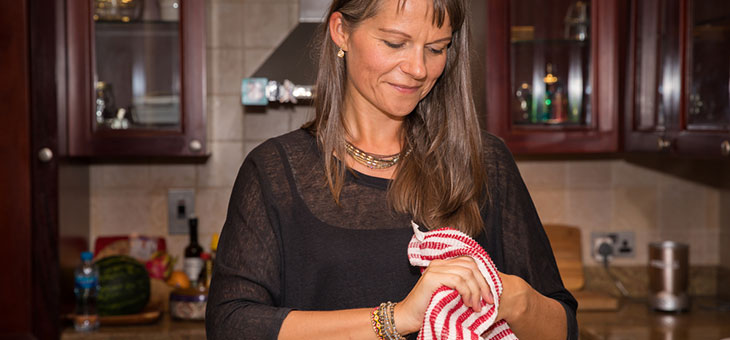Raise your hand if you wash your kitchen tea towel every day. Yep, we don’t either. But new research has found that your humble tea towel could be putting you and your family at risk of food poisoning. So, you might want to start popping yours in the wash a lot more often after reading this.
After analysing 100 tea towels, scientists at the University of Mauritius found alarmingly high amounts of bacteria, including E. coli, which causes everything from food poisoning to urinary tract infections.
The researchers supplied 100 tea towels to participants (36 were a mixture of cotton and nylon, 31 were pure cotton and 33 were pure nylon) and collected them after one month to analyse any bacteria present on them.
The results revealed bacterial growth in 49 per cent of the tea towels, with cotton tea towels having the highest bacterial levels of all three kinds.
The study identified two factors that led to increased bacterial growth: multipurpose use and family size. Tea towels that were used for a variety of tasks (such as for wiping bench tops, in addition to drying hands and dishes) had the highest levels of bacteria.
Likewise, the researchers found bacterial growth increased significantly in families with more people and particularly where children were present.
Now, before you get too worried, here’s some context:
The participants were asked questions about their lifestyle and family, including their tea towel use, diet and family size. However, they weren’t asked whether they had actually contracted food poisoning or other gastrointestinal illnesses during the one-month period.
The researchers also found that moist or ‘humid’ tea towels had significantly higher traces of particular types of bacteria, such as coliforms, which are a class of bacteria typically found in the digestive tract and faeces of animals (including humans). While most coliforms are harmless, rare strains do exist that can cause serious illness.
What does it all mean?
Overall, while the research sheds some light on the state of the humble kitchen tea towel, we needn’t be too concerned. Most of the bacteria found were of the enterococcus and pseudomonas species, which don’t typically cause food poisoning.
However, the research does give us some practical points to think about.
To limit your and your family’s exposure to bacteria, it’s best to wash your tea towel after every use. If this is impossible or unlikely, waiting until tea towels are dry will help, as dry tea towels have a lower bacteria load than damp ones.
Another tip is to use tea towels for single purpose and not for multiple tasks. You might consider colour coding your tea towels and using them for designated tasks; one for drying the dishes, another for drying hands, etc. This will also help to reduce the towel’s bacteria load.
Want to read more about the research findings? This article in The Conversation provides some useful insights.
Are you guilty of using your tea towel for days on end without washing it? And do you use it to wipe up the occasional spill on the floor?
Related articles:
Are your cleaning products toxic?
Do soapless dispensers kill germs?
25 ingenious cleaning tricks

